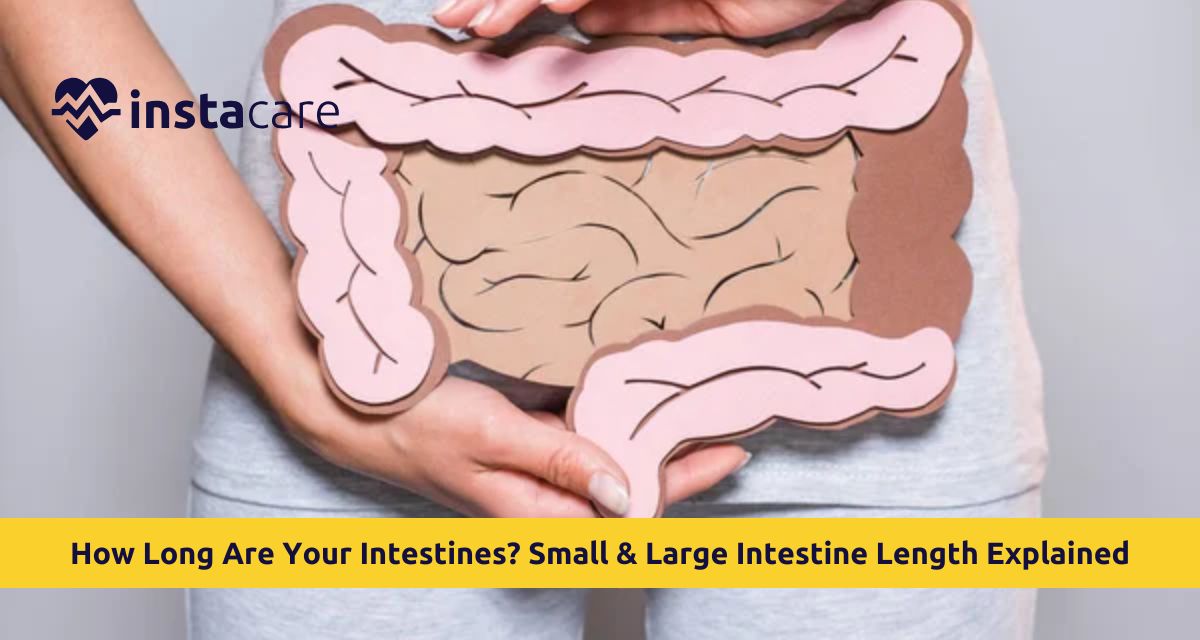It is where we find out the anatomy of intestines, determine how long an adult intestine must be, and why your intestines' anatomy and physiology are specifically made to make your digestive system length rumble along like clockwork. You might find it fascinating or interesting, but the more you understand about your gut, the better.
Anatomy of the Human Intestinal Tract
The human body contains the necessary portion, the intestinal tract, which runs from the stomach to the anus. It's split into two fundamental parts:
- Small Intestine
- Large Intestine
They both break down the food, extract water and nutrients, and remove waste. Although curled tightly in your tummy, the intestines are a good length, a quite respectable distance that's several times longer than your height.
How Long Is the Small Intestine?
Longest but shortest segment of the GI tract and where nutrient digestion and absorption primarily takes place.
Typical length:
- 20 to 23 feet (6 to 7 meters) long in adults
- Up to 25 feet (7.5 meters) in rare cases
Anatomy:
Composed of three segments:
- Duodenum: Short segment (~10 inches), which is attached to the stomach.
- Jejunum: Central segment, where most of the nutrient absorption is carried out.
- Ileum: Terminal and longest part, into large intestine.
Function of small intestine length:
Impressive length enables it to possess a humongous surface area to process food and nutrients, owing to features such as villi and microvilli.
It helps you absorb necessary vitamins, minerals, proteins, fats, and carbs into your bloodstream.
How long is the large intestine?
In fact shorter than the small intestine, but wider in diameter, hence "large."
Normal length:
- Around 5 feet (1.5 meters) in adults
Anatomy:
- Cecum
- Colon (ascending, transverse, descending, and sigmoid)
- Rectum
- Anal canal
Function of large intestine length:
- Absorbs water and electrolytes
- Shapes and stores feces
- Punishes gut bacteria which is responsible for digestion and immunity
The anatomy of large intestine is optimally suited for these functions even with shortened length.
Total Intestinal Length in Humans
So how long is the entire intestine in adults when small and large intestines are joined together?
- Average intestine length in adults: Approximately 25 to 28 feet (7.5 to 8.5 meters) total length
- That's roughly intestine length compared to body height, all coiled up and hugged inside your stomach.
Intestine Length Factors
No two persons have intestines of equal length. Intestine length in children vs adults varies based on many factors:
Age
- Infants and children have short intestines that continue to lengthen as they grow up.
- Intestine length in feet/meters also increases with growth.
Sex
Female sex has been discovered to be linked with slightly longer mean small intestines, perhaps in order to absorb more nutrients during pregnancy.
Heredity
As with all body characteristics, genes control intestine length.
Diet
Vegetarians or individuals consuming a high-fiber diet can lengthen intestines later in life as the body adjusts to breaking down more complicated carbohydrates.
Medical Conditions or Surgery
Some diseases (e.g., Crohn's disease) or surgeries (e.g., resection of a segment of the bowel) shorten intestines, sometimes causing short bowel syndrome.
Why Intestinal Length Matters
How long your intestines are isn't some arbitrary tinfoil trivia factoid—a pretty cool bit of trivia, they even have a hand in how efficiently your body can digest and absorb food.
Why it matters:
- More room to absorb water and nutrients = longer intestines
- Good digestion = your body receiving the energy and vitamins that it requires
- Short intestines = life-threatening dehydration and nutrition deficiency diseases
Digestion effects
- Intestine length and digestion are closely linked.
- Small intestine length allows for slow, effective breakdown of food particles.
- Large intestine function allows for effective development of stool and water absorption.
- Too much food (diarrhea) will leave no space for nutrient and water uptake.
Overall, how long your intestines are is an extremely crucial factor in your entire intestinal tract length and nutrient uptake.
Great Intestine Facts
Some fun and surprising facts to give you a gut-burst of knowledge:
- If you stretched out and were to lie flat, your intestines would stretch across a tennis court, thanks to microscopic folds within.
- Your small intestine propels food along by way of muscle contractions called peristalsis, even while you're in bed.
- Your gut has its own nervous system, the enteric nervous system, or as others refer to it, the "second brain."
- Your colon contains trillions of bacteria that reside within, breaking down the undigested food and producing vitamins such as B12 and K.
- Your gut is constantly replacing cells, regenerating its entire lining every 4–5 days.
Intestines are much more than "food tubes." They're a secret, dynamic system influencing your immunity, mood, and energy.
Conclusion
Human intestines, despite being in your body, hold the secret to keeping your overall health. Small intestine and large intestine are an effective gastro-intestinal pair that makes your body capable of extracting nutrients, water, and energy from food. The 20 to 23 feet long small intestine is the digestive organ and nutrient absorption organ.
It is likened to the giant intestine of approximately 5 feet and for water absorption and storing waste in preparation to vacate. The entire intestinal tract altogether is 25 to 28 feet long, roughly half the length of your body. Learning the shape and function of your intestines not only introduces you to how advanced your digestive system is, but also to how important it is for you to keep your gut healthy so that you can fuel yourself, energize yourself, and sustain yourself on a daily basis.
Please book an appointment with the
best General Physician in Lahore, Karachi, Islamabad, and all major cities of Pakistan through
InstaCare, or call our helpline at 03171777509 to find the verified doctor for your disease.

